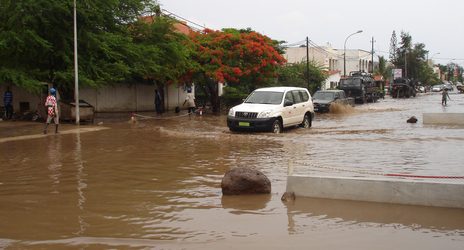“The session is a good opportunity to open the conversation about natural disasters and discuss innovative financing mechanisms that we could use on the continent to proffer a realistic solution to the underlying causes of migration, notably natural disasters and extreme weather events…”, she told the opening of a roundtable discussions session on “Refugees, Returnees and Internally Displaced Persons: Towards Durable Solutions to Forced Displacement in Africa”. in the Ethiopian Capital, Addis Ababa on Saturday.
The African Risk Capacity (ARC), is a specialized agency of the African Union (AU) established in 2012 to help member states better plan, prepare and respond to extreme weather events and other natural disasters, thereby protecting the food security and livelihoods of their most vulnerable populations.
With ARC, the AU has set the pace at the continental level by convening African leaders to establish an institution that can deploy innovative mechanisms that respond to the growing impact on natural
disasters and extreme weather events on the continent.
With the support of the United Kingdom, Germany, Sweden, Switzerland, Canada, France, The Rockefeller Foundation and the United States, ARC assists AU Member States in reducing the risk of loss and damage caused by extreme weather events affecting Africa’s populations by providing, through sovereign disaster risk insurance, targeted responses to natural disasters in a more timely, cost-effective, objective and transparent manner. ARC is now using its expertise to help tackle some of the other greatest threats faced by the continent, including outbreaks and epidemics.
In 2015, ARC demonstrated that the concept was indeed working, with $26 million dollars paid to three countries in the Sahel as early as a few weeks after the end of the harvest, following significant rainfall deficit in the region. This allowed the beneficiary countries to rapidly deploy assistance to 1.3 million people, and 900 000 cattle.
In 2017 and 2018, additional funds were triggered, $8.1 million to Malawi, and in 2018, $2.4 million USD to Mauritania. To date, countries have taken out coverage of approximately $500 million and
paid $60 million of premium.
Historically, migration on the African continent has been caused by political instability, civil insecurity, and poverty. But in recent times, migration is accelerated by the negative impacts of climate change.
Between 2008 and 2015, an average of 26 million was displaced annually by climate or weather-related disaster, while in 2016 an estimated 1.1 million people were displaced by sudden onset natural hazards.
The increasing frequency of droughts, floods, and other extreme weather events means that migration is expected to grow further. These intersecting climate and migation trends in Africa increase the vulnerability of the poor populations, namely the smallholder farmers that rely on subsistence, rainfed agriculture and form the backbone of the African economies.
“It is imperative to encourage AU Member States to subscribe to the ARC mechanism considering the level of success it has achieved in bringing a complementarity that can address challenges associated with the causes of migration within the five years of its existence.” Said the African Union Commissioner for Rural Economy and Agriculture, Sacko Josefa Leonel Correa.
For his part, Prof Vincent Nmhielle, Secretary General of the AFDB, who represented the President, Mr. Akinwunmi Adesina said considering that the livelihoods of more than 70 percent of Africans depend on farming, the ‘High 5 Agenda’ of the AfDB identified “Feed Africa” as one of the pillars with the aim, among other initiatives, to enhance resilience and response to climate shocks in regional member countries.
“Our goal is to help unlock the potential of agriculture in the continent; hence the Bank’s introduction of the Africa Disaster Risk Financing (ADRiFi) programme to scale up the protection against extreme weather events in rural areas and expand access to ARC’s risk transfer facilities for African Union Member States”, stated Prof. Nmhielle.
The event was held in line with Executive Council Decision where the Council “Further Requested the Commission to engage with ARC to develop concrete mechanisms and instruments of collaboration to raise awareness and galvanize political support amongst the Member States.


